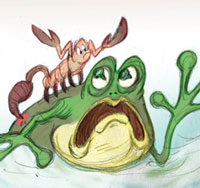 The National Corn Growers Association (NCGA) is concerned about the company the meat industry is keeping in an “unholy” anti-ethanol alliance with some environmental groups that also have an anti-meat agenda.
The National Corn Growers Association (NCGA) is concerned about the company the meat industry is keeping in an “unholy” anti-ethanol alliance with some environmental groups that also have an anti-meat agenda.
The alliance, which kicked off a major campaign last week opposing the proposed increase in the allowable level of ethanol in gasoline to 15 percent, includes the American Meat Institute, along with organizations like the Natural Resources Defense Council and the Environmental Working Group. NCGA CEO Rick Tolman noted in an editorial that “AMI’s “allies” in this fight roundly condemn corn and soybean production as environmentally unfriendly. An NRDC representative, in recent Congressional testimony, suggested that we grow “too much” corn in the United States and we ought to be growing less. NRDC also has promoted eating “grass-fed” over “corn-fed” beef.”
 AMI responded to NCGA’s concerns that they remain “committed to our opposition to ethanol subsides and tax credits, a position that is supported by a broad cross-section of producers, processors, consumers and, especially, American taxpayers.”
AMI responded to NCGA’s concerns that they remain “committed to our opposition to ethanol subsides and tax credits, a position that is supported by a broad cross-section of producers, processors, consumers and, especially, American taxpayers.”
Not the point, responded Tolman, it’s not about ethanol:
Our concern, and our members’ outrage, is with the choice of allies and the tactics being employed. For example, here is one of their statements: “More corn ethanol is bad for the environment. Producing more corn ethanol could threaten air quality in many communities, destroy millions of acres of forests around the world, and increase emissions of greenhouse gases. In particular, plowing up forests to grow more corn could increase farmland runoff, expanding low-oxygen dead zones that hurt commercial fishermen.”
 That statement is really about the radical environmental groups view about corn production. Think of the damage these and other statements make to the image of hard working corn producers. One would think that the members of AMI – companies such as Smithfield, Tyson and Hormel – support corn production. Substitute the phrase “corn-fed beef” instead of “corn ethanol” and you can easily see the danger.
That statement is really about the radical environmental groups view about corn production. Think of the damage these and other statements make to the image of hard working corn producers. One would think that the members of AMI – companies such as Smithfield, Tyson and Hormel – support corn production. Substitute the phrase “corn-fed beef” instead of “corn ethanol” and you can easily see the danger.
He compares it to the fable about the scorpion and the frog, where the frog agrees to carry the scorpion across the river on his back. Once across the river, the scorpion stings the frog and kills him. As he is dying, the frog says, “But I carried you across the river! Why did you sting me?” The scorpion replies that the frog knew he was a scorpion, and that’s what scorpions do.
NCGA’s message to AMI is, “Rejoin the rest of agriculture and step away from the scorpion.”

